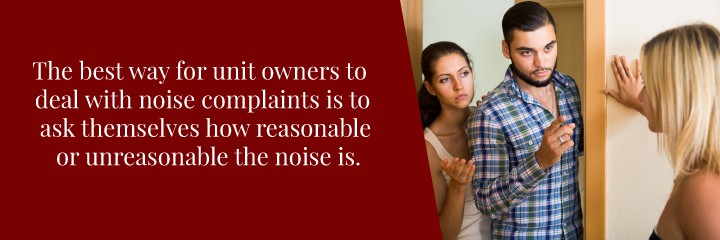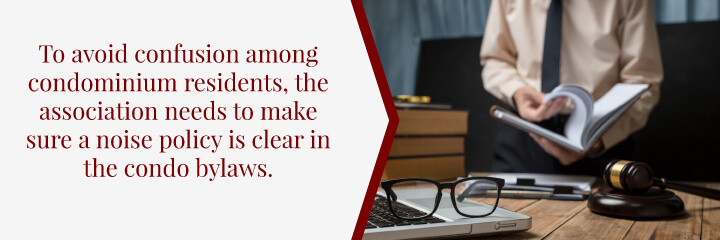How Should a Condominium Association Deal With Noise Complaints
Noise complaints can be a tough issue to tackle, both for a condo or homeowners’ association (HOA) and individual unit owners. Residents should be aware of their condo association’s or HOA’s noise rules and consider what constitutes a reasonable noise complaint. Condo associations and HOAs can best address noise complaints by ensuring that their noise rules and regulations are clear, practical, and enforceable.
Contact a Condominium Attorney
What Is Reasonable When It Comes to Condo Noise?
On the one hand, condominium associations have a fair amount of freedom to create and enforce their own set of condo rules. On the other hand, the rules need to be reasonable and must relate to the use, enjoyment, health, and happiness of the condominium residents.
Enforcing HOA Noise Regulations
If a neighbor is breaking condo association or HOA noise regulations or violating local sound ordinances, then measures can be taken to enforce those rules. In addition, the association can take action to address reasonable complaints that may not be directly stated in the bylaws.
For example, it may be considered unreasonable for a unit owner to use power tools at 3 a.m. It may or may not be stated in the master deed or bylaws that this specific behavior is not allowed, but the association may take action after a complaint. The unit owner is interfering with the health of other unit owners by disturbing their sleep, and their behavior is unreasonable.
Resolving Unreasonable Noise Complaints
However, if a unit owner complains they hear their neighbor flush the toilet at 3 a.m. every morning, and they demand their neighbor get evicted for such a disturbance, this complaint would likely be considered unreasonable. In this situation, it makes more sense for an association member to suggest that the unit owner soundproof their unit.
How to Determine Whether an HOA Noise Complaint Is Reasonable or Unreasonable
As these examples suggest, you often have to decide what is reasonable to determine whether a condo noise complaint is justified, which means more than finding specific rules in the bylaws. Sometimes — like when a resident uses power tools at 3 a.m. — deciding what’s reasonable can be straightforward. In other cases, making that call is more complicated. How do you determine what is reasonable regarding noise, particularly if the condominium allows pets? Consider questions like:
- Has the noise issue been going on for a while? If a neighbor is loud for an afternoon, it may make sense to wait and see if it happens again. If the neighbor makes loud noises more frequently, addressing the problem would be more reasonable.
- Is the noise affecting other neighbors, too? If several people or households have the same concern, that impact supports the complaint that the amount of noise may be unreasonable. Sounds that affect several residents, such as those who share no walls with the loud party, are likely more severe.
- Has the noise issue continued even though you’ve attempted to address it with your neighbor? Many people will do their best to reduce or eliminate a noise issue if a neighbor brings it up with them in a friendly way. A formal HOA noise complaint may be reasonable if a resident cannot or will not resolve the issue.
How Should a Condo Association Communicate and Enforce Noise Regulations?
A condo association and its board of trustees have the power to control and police what goes on inside a unit to the extent such activity creates unreasonable noise that affects the lives of the other unit owners. This policy must be within reason and strive to accommodate all the unit owners in the best way possible.
Ways a Condo Association Can Communicate Noise Regulations
To avoid confusion among condominium residents, and to ensure the rules can be enforced, the association needs to make sure a noise policy is clearly stated in official documents.
According to Massachusetts laws covering condominiums, rules intended to “prevent unreasonable interference with [residents’] use of their respective units” must be contained in the master deed or in bylaws. Examples of these rules include restrictions and requirements regarding unit maintenance and the use of common areas and facilities.
If the rule isn’t documented clearly in either of those places, it will be significantly more difficult to enforce such a rule in court if a serious dispute arises.
Not everyone living in or visiting a condominium complex will read the bylaws, so it can be helpful to post noise rules in common areas, too. For example, if there have been issues with people making noise while using pools or patios late at night, the condo association could post signs reminding residents and guests about quiet hours. Since these signs would refer to rules listed in the bylaws, they would be more effective than posting an informal list of suggestions or preferences.
Measures a Condo Association Can Take to Enforce a Noise Complaint
When a condo association has established rules, it must also have the authority to enforce them. For example, an HOA board can handle minor disturbances or contact law enforcement for escalated situations.
Condo associations can take these steps to enforce noise complaints:
- Verify the complaint: The association should ensure the HOA noise complaint refers to an incident that violates the bylaws or is otherwise justifiable.
- Give a warning: If the condo association must enforce its noise policy, it will usually start by issuing a warning. This initial communication can often resolve an issue before more serious steps are necessary.
- Issue a fine: If a warning is ineffective, the association may have the power to issue fines to enforce rules set out in its bylaws or master deed.
If an owner refuses to pay those fines, the association may be able to place a lien on the unit. If the owner does not pay the lien, the association may have the right to begin eviction proceedings.
At each stage in the process, the association must keep records of its actions and communications — and of the unit owner’s responses.
Contact Calabrese Law Associates for HOA Noise Complaints
To learn more about condo rules and laws regarding noise, contact one of our condominium lawyers at Calabrese Law Associates for assistance.
This publication and its contents are not to be construed as legal advice nor a recommendation to you as to how to proceed. Please consult with a local licensed attorney directly before taking any action that could have legal consequences. This publication and its content do not create an attorney-client relationship and are being provided for general informational purposes only.
Attorney Advertising. Prior results do not guarantee a similar outcome.
” src=”data:image/gif;base64,R0lGODlhAQABAIAAAAAAAP///yH5BAEAAAAALAAAAAABAAEAAAIBRAA7″ alt=”




